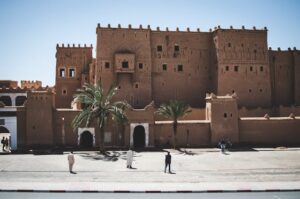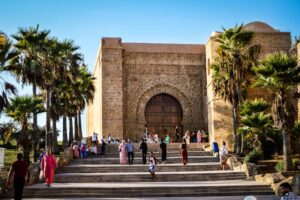Setting up a company in Morocco involves a straightforward process: choose a legal structure, reserve your company name through OMPIC, prepare articles of association, deposit share capital in a Moroccan bank, and register with the Regional Investment Center (CRI).
Once registered, you’ll receive a commercial registration number, tax ID, and social security registration. Depending on your business sector, you may also need special licenses or permits.
This article explains why Morocco is an attractive destination for business, the types of companies you can establish, the step-by-step registration process, and key requirements for foreign investors.
My contact details are hello@adamfayed.com and WhatsApp +44-7393-450-837 if you have any questions.
The information in this article is for general guidance only. It does not constitute financial, legal, or tax advice, and is not a recommendation or solicitation to invest. Some facts may have changed since the time of writing.

Why Invest in Morocco
Morocco has positioned itself as one of the leading gateways to Africa, while also maintaining strong ties to Europe and the Middle East. Its strategic location makes it a natural hub for trade, investment, and logistics, with easy access to key global markets.
The country offers several advantages for entrepreneurs and foreign investors:
- Trade access: Morocco has free trade agreements with the European Union, the United States, and multiple African countries, giving businesses based there access to hundreds of millions of consumers.
- Political and economic stability: The government has introduced reforms to streamline company registration, improve infrastructure, and attract international investment.
- Growing industries: Morocco is developing as a leader in renewable energy, automotive manufacturing, textiles, IT outsourcing, and tourism. These sectors create opportunities for both local and foreign entrepreneurs.
- Investor-friendly policies: Foreigners are allowed to fully own Moroccan companies, and the government provides incentives in free zones and special economic regions.
Taken together, these factors make Morocco a competitive base for businesses looking to expand into Africa or establish operations with international reach.
Doing Business in Morocco
Before starting the registration process, it’s important to decide on the legal structure of your business. Morocco offers several options, but the most common are:
- Société à Responsabilité Limitée (SARL): Equivalent to a limited liability company (LLC), this is the most popular structure for small and medium enterprises. It requires at least one shareholder, offers limited liability protection, and has minimal capital requirements.
- Société Anonyme (SA): Similar to a joint-stock company, this structure is suited for larger enterprises or businesses planning to raise capital. It requires a higher minimum share capital and a board of directors.
- Branch or Representative Office: A foreign company can establish a branch to conduct commercial activities or a representative office for non-commercial purposes such as market research.
- Other forms: General and limited partnerships also exist, but they are less common due to their unlimited liability for partners.
The choice of structure depends on the size of the business, the level of liability protection required, and long-term growth plans. For most investors, the SARL offers the simplest and most flexible entry point into the Moroccan market.
What are the requirements for opening a company in Morocco?
In most sectors, foreign investors can fully own Moroccan companies without needing a local partner.
However, every company must have a registered address in Morocco, either through ownership, lease, or a domiciliation service.
While most companies can operate after registration, certain sectors like food, tourism, or healthcare also require additional permits.
Registering a Company in Morocco
The process of incorporation in Morocco follows a clear sequence of legal and administrative steps, most of which can be handled through the Regional Investment Center (CRI), which acts as a one-stop shop.
- Choose your company type and check sector rules
Decide on the legal form of your business. Most entrepreneurs opt for the SARL (limited liability company), which has minimal capital requirements and is flexible for small and medium enterprises. Larger ventures may choose an SA (joint-stock company), which requires higher share capital. Certain industries—such as finance, healthcare, or education—require special approvals before incorporation. - Secure a registered office address
Every company in Morocco must have a registered address. This can be arranged through a lease, owned property, or a domiciliation contract with a business address provider. Proof of address is a mandatory part of the incorporation file. - Reserve your company name (Negative Certificate)
Apply through the Moroccan Office of Industrial and Commercial Property (OMPIC) for a “negative certificate” confirming your trade name is available. This certificate, usually valid for 90 days, is required for the next steps and also assigns your ICE (Common Business Identifier). - Draft and legalize the articles of association
Prepare the company statutes (articles of association), which set out the business purpose, shareholding structure, and management rules. These must be signed and legalized at a municipal office or Moroccan consulate. Copies of identification documents for shareholders and managers must also be prepared. - Deposit share capital (if required)
For SARLs with capital above MAD 100,000, and for all SAs, share capital must be deposited into a Moroccan bank account. The bank issues an attestation de blocage confirming the deposit, which is included in the registration file. For smaller SARLs, a pre-registration deposit is not always required, though many investors still provide a minimum capital for credibility. - Register constitutive acts with the tax office
Within 30 days of signing the articles of association, the documents must be filed with the Moroccan tax authority (DGI) for registration. The tax office stamps the documents, confirming they are compliant, and these stamped copies go into the incorporation dossier. - File incorporation with the Regional Investment Center (CRI)
Submit the complete dossier—including the negative certificate, legalized and tax-registered articles, manager ID, proof of office address, and bank certificate (if applicable)—to the CRI or directly to the commercial court registry. The CRI coordinates the registration with the relevant offices. - Obtain registration numbers and certificates
Once approved, you will receive:- An extract from the Commercial Register (RC), which is the company’s official ID.
- A tax identification number (IF) and registration for professional tax.
- Confirmation or activation of your ICE across systems.
- Registration with the CNSS (social security) if staff are to be employed.
- Publish legal notices
The incorporation must be published in a legal announcements journal (JAL) and in the Arabic-language Bulletin Officiel (BO). Proof of publication is required to finalize the registration process. - Register with CNSS and other authorities
If you plan to hire staff, the company must affiliate with CNSS and enroll employees for social security contributions. Some municipalities or sectors may also require additional permits or local authorisations before operations can begin. - Activate your bank account
Once the commercial register and publications are in hand, the bank converts the company’s blocked account into a regular corporate account, releasing deposited funds for use in business operations.
With these steps completed, the company is legally incorporated and ready to start operations.
How much does it cost to open a company in Morocco?

For a basic SARL (limited liability company) with simple cash capital, the administrative costs including name reservation, notary fees, trade register, tax registration, and legal announcements can be as low as MAD 5,000 to 10,000 (around USD 500–1,000) if handled directly.
Most foreign investors, however, should budget more realistically for MAD 30,000 to 80,000 (USD 3,000–8,000), which covers legal drafting, banking setup, registered office fees, and advisory services.
Larger or more complex setups, such as SAs (joint-stock companies), free zone companies, or businesses in regulated sectors, can exceed MAD 100,000 (USD 10,000+), especially when higher capital deposits, specialized permits, or in-kind contributions are involved.
Generally, for the cost of setting up a company in Morocco, it will vary depending on the structure and sector but likely includes:
- Name reservation fee for the negative certificate from OMPIC.
- Notary or legal fees for drafting and registering the articles of association.
- Banking fees to open the corporate account and deposit share capital.
- Registration fees at the Commercial Register and tax authorities.
- Optional costs for a domiciliation service if you do not have your own office.
How long does it take to register a company in Morocco?
Company registration usually takes between seven and ten business days once all documents are ready.
Delays may occur if additional permits are required or if documents need translation and notarisation.
Opening a Business Bank Account in Morocco
Opening a corporate bank account is a mandatory step in the incorporation process, as it is required to deposit share capital and manage company transactions.
To open the account, most banks will ask for:
- The company’s articles of association
- The negative certificate confirming the company name
- Proof of registered address (lease or domiciliation contract)
- Identification documents of shareholders and managers
- Bank certificate of capital deposit (once funds are transferred)
Foreign investors can open accounts in Morocco, but banks may require additional documentation to comply with anti-money laundering and foreign exchange regulations.
It is recommended to work with a bank or an expat financial advisor experienced in handling corporate accounts for international clients.
Pained by financial indecision?

Adam is an internationally recognised author on financial matters with over 830million answer views on Quora, a widely sold book on Amazon, and a contributor on Forbes.



